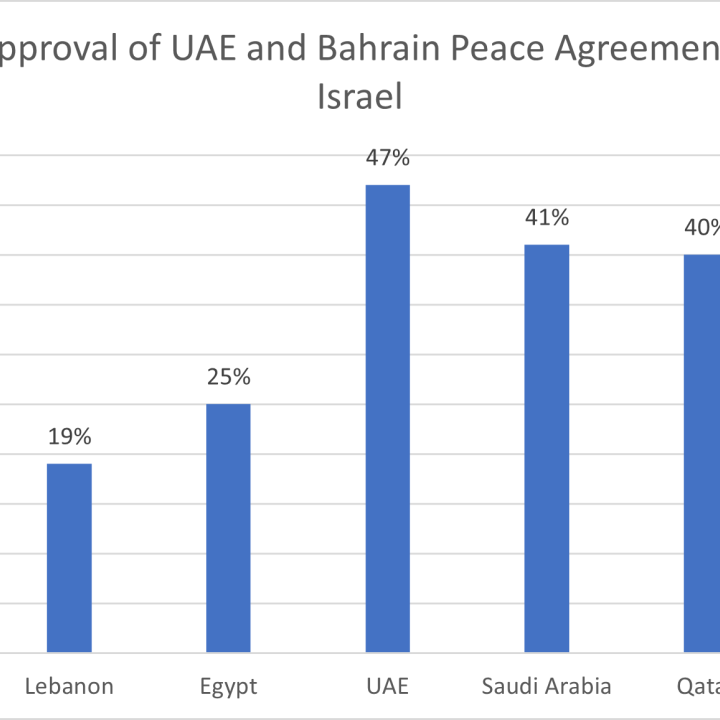
- Policy Analysis
- PolicyWatch 3609
New Arab Polls on Ukraine, Iran, Israel, and China: Analysis and Implications

Three public opinion experts discuss what March and April surveys in key states reveal about local attitudes toward U.S. policy.
On April 28, The Washington Institute held a virtual Policy Forum with David Pollock, Catherine Cleveland, and Munqith Dagher. Pollock is the Institute’s Bernstein Fellow and director of Fikra Forum. Cleveland is the Institute’s Wagner Family Fellow and managing editor of Fikra Forum. Dagher is the Middle East and North Africa director for Gallup International. The following is a rapporteur’s summary of their remarks.
David Pollock
Washington Institute polls completed this March before the onset of Ramadan revealed shocking results in Egypt, Jordan, Kuwait, Saudi Arabia, and the United Arab Emirates. The otherwise anomalous results are especially credible due to the survey methodology—encompassing 1,000 individuals per nation chosen at random and polled through in-person interviews, all with utmost confidentiality and anonymity.
Throughout the three Gulf nations surveyed (Kuwait, Saudi Arabia, and the UAE), three overarching trends were evident: their populations regard government ties with Russia as equal or greater in perceived importance compared to ties with the United States; 50% or more view the United States as an unreliable partner in global affairs; and 75% see no benefit in the American quest to revitalize the Iran nuclear deal.
In terms of regional influence, no more than 16% of polled populations in these Gulf nations see relations with Iran as important. The results are more nuanced for great power relations—Saudis and Emiratis indicate that Russia and China are edging out U.S. influence in the region, but Kuwaitis conveyed near equal claims of importance to each of the three powers.
The results from Egypt and Jordan shined a more optimistic light on perceptions of the United States, but they also unveiled key failures in the attempt to expand Arab normalization with Israel past the official stage and into popular support. While a plurality of Egyptians view Russia and the United States as equally important partners, a majority of Jordanians believe maintaining U.S.-Jordanian relations is important. Yet only 10% of either population holds a positive view of the Abraham Accords or believes that their compatriots should be able to build business contacts with Israelis.
Catherine Cleveland
Although the March polls accounted for age differences, there was little nuance in opinion across the age gap. In contrast, there were some noticeable examples of nuances across Sunni and Shia communities. For example, while most Sunnis viewed Iranian intervention in the region as detrimental to local populations, Shia overwhelmingly disagreed.
Additionally, while most every subgroup viewed Russia’s invasion of Ukraine negatively, over 50% of Lebanese Shia supported it. This is even more notable given that most populations surveyed were near evenly split in their views on which nation—Russia or the United States—could better protect them against foreign enemies.
That being said, respondents across the board did not view relations with Iran as particularly important. Accordingly, less than a third in most countries saw reviving the nuclear deal as a positive.
Munqith Dagher
Despite arguably investing more into the Middle East/North Africa than any other great power, the United States is increasingly viewed with apathy by those who call the region home, particularly Iraqis. In the immediate wake of the 2003 Iraq war, Kurdish and Shia populations were largely elated by an American intervention that deposed a dictator who had long oppressed them. Yet the sheer enormity and rapid succession of U.S. policy mistakes in Iraq quickly fumbled this potentially decisive popularity.
This trend has been exacerbated in the wake of successive efforts by the Obama, Trump, and Biden administrations to withdraw from the region, as most recently evidenced in Afghanistan. Locals also perceive other forms of uninterest among American politicians.
April polling in Iraq echoes many of The Washington Institute’s survey results from other Arab countries. When it comes to great power competition, the United States is seen as an unreliable partner that fails to uphold its values and goals in the region, while China consistently fulfills its goals (albeit more limited ones) and its promises to regional partners.
That being said, the United States still holds unrivaled respect in its efforts to uphold human rights, democracy, and social mobility, and America remains the highly preferred option for immigration. U.S. policymakers must not fumble this last drop of goodwill; instead, they should leverage it to fulfill policy goals.
To explore this data further, access TWI's interactive public opinion poll database here.
This summary was prepared by Dylan Kassin. The Policy Forum series is made possible through the generosity of the Florence and Robert Kaufman Family.





